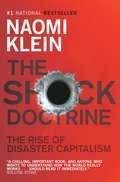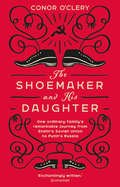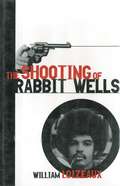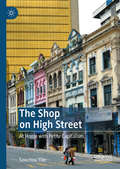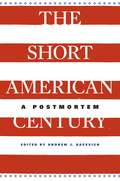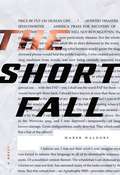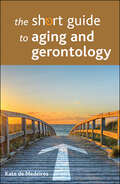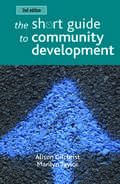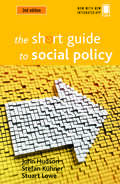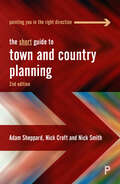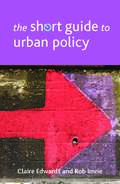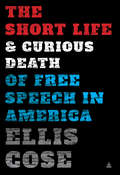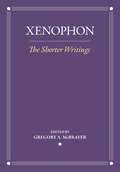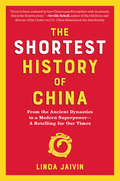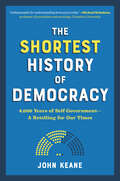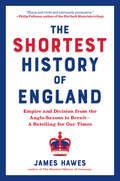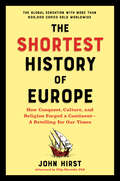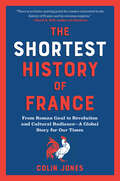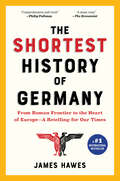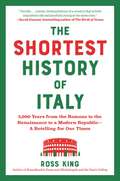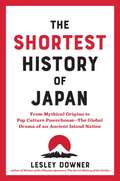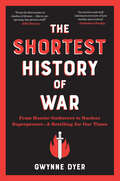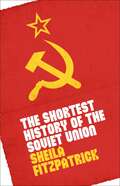- Table View
- List View
The Shock Doctrine: The Rise of Disaster Capitalism
by Naomi KleinThe shock doctrine is the unofficial story of how the "free market" came to dominate the world, from Chile to Russia, China to Iraq, South Africa to Canada. But it is a story radically different from the one usually told. It is a story about violence and shock perpetrated on people, on countries, on economies. About a program of social and economic engineering that Naomi Klein calls "disaster capitalism."Based on breakthrough historical research and 4 years of reporting in disaster zones, Klein explodes the myth that the global free market triumphed democratically, and that unfettered capitalism goes hand-in-hand with democracy. Instead, she argues it has consistently relied on violence and shock, and reveals the puppet strings behind the critical events of the last 40 years."The shock doctrine" is the influential but little understood theory that in order to push through profoundly unpopular policies that enrich the few and impoverish the many, there must be a collective crisis or disaster—real or manufactured. Klein vividly traces the origins of modern shock tactics to the economic lab of the University of Chicago under Milton Friedman in the 60s, and beyond to the CIA-funded electroshock experiments at McGill in the 50s which helped write the torture manuals used today at Guantanamo Bay. She details the events of the recent past that have been deliberate theatres for the shock doctrine: among them, Pinochet’s coup in Chile in 1973, the Tiananmen Square Massacre in 1989, the collapse of the Soviet Union in 1991; and, more recently, the September 11 attacks, the invasion of Iraq, the Asian tsunami and Hurricane Katrina. And she shows how—in the hands of the Bush Administration—the "war on terror" is a thin cover for a thriving destruction/reconstruction complex, with disasters, wars and homeland security fuelling a booming new economy. Naomi Klein has once again written a book that will change the way we see the world.
The Shoemaker and his Daughter
by Conor O'CleryWINNER OF THE 2020 MICHEL DÉON PRIZE'O'Clery takes us into the hidden heart of Soviet Russia... An arresting and evocative story' Keggie Carew, author of Dadland'A tour de force ... Love, politics, murder, wars, and the fracturing of ties, personal and ethnic. O'Clery is a gifted writer' Luke Harding, bestselling author of CollusionThe Soviet Union, 1962. Gifted shoemaker Stanislav Suvorov is imprisoned for five years. His crime? Selling his car for a profit. On his release, social shame drives him and his family into voluntary exile in Siberia, 5,000 kilometres from home. In a climate that's unfriendly both geographically and politically, it's their chance to start again. The Shoemaker and His Daughter is an epic story spanning the Second World War to the fall of the Soviet Union, taking in eighty years of Soviet and Russian history, from Stalin to Putin. Following the footsteps of a remarkable family Conor O'Clery knows well - he is married to the shoemaker's daughter - it's both a compelling insight into life in a secretive world at a siesmic moment in time and a powerful tale of ordinary lives shaped by extraordinary times.
The Shooting of Rabbit Wells: A White Cop, a Young Man of Color, and an American Tragedy
by William LoizeauxWhat put a white cop and a black youth on a tragic collision course? On a frigid winter’s night in 1973, William "Rabbit” Wells, a young man of mixed race, was shot and killed by a white policeman named William Sorgie outside a bar. The shooting stunned the placid, prosperous communities of New York. For twenty-five years author William Loizeaux, who went to high school with Rabbit, hasn't been able to let go of a story that struck at the core of the place that he, along with Rabbit and Sorgie, called home. With clear-eyed compassion and unsparing honesty, The Shooting of Rabbit Wells recreates the lives of both victim and killer and the forces that brought them together. By giving us the life of Rabbit Wells, Loizeaux makes us understand-and feel-how unacceptable and irreparable his loss was, and how deeply the bullet that killed him is lodged in the American identity.
The Shop on High Street: At Home with Petite Capitalism
by Souchou YaoThis book tells the story of a Chinese family owned shophouse in Kuala Lumpur, Malaysia, through the lens of petite capitalism. Neo-Marxist in spirit, literary in tone, it recounts the triumph and despair of a family in its struggles against the financial frailty and structural limitations of a pervasive economic form of the Chinese diaspora: the small family business. The daily realities of the Chinese shophouse are captured by the art of ethnography and the author’s own memories. The book examines Chinese petite capitalism afresh by bringing into focus issues not usually covered by writers on the subject—the concept of petite capitalism, the architecture of the Asian shophouse, the Hakka kinship, ‘tiger parenting’ and Chinese childrearing, the culture of debt, family legacy, and Chinese inheritance. The book reveals the business acumen for which the Chinese diaspora are renowned as part truth and part myth. Schumpeter’s ‘creative destruction’ haunts the small Chinese family business where hard work and individual efforts are helpless against the ever-evolving nature of capitalism.
The Short American Century
by Edited by Andrew J. BacevichWriting in Life magazine in February 1941, Henry Luce memorably announced the arrival of the “The American Century. ” The phrase caught on, as did the belief that America’s moment was at hand. Yet as Andrew J. Bacevich makes clear, that century has now ended, the victim of strategic miscalculation, military misadventures, and economic decline. To take stock of the short American Century and place it in historical perspective, Bacevich has assembled a richly provocative range of perspectives. What did this age of reputed American preeminence signify? What caused its premature demise? What legacy remains in its wake? Distinguished historians Jeffry Frieden, Akira Iriye, David Kennedy, Walter LaFeber, Jackson Lears, Eugene McCarraher, Emily Rosenberg, and Nikhil Pal Singh offer illuminating answers to these questions. Achievement and failure, wisdom and folly, calculation and confusion all make their appearance in essays that touch on topics as varied as internationalism and empire, race and religion, consumerism and globalization. As the United States grapples with protracted wars, daunting economic uncertainty, and pressing questions about exactly what role it should play in a rapidly changing world, understanding where the nation has been and how it got where it is today is critical. What did the forging of the American Century-with its considerable achievements but also its ample disappointments and missed opportunities-ultimately yield? That is the question this important volume answers.
The Short Fall
by Marek WaldorfA speechwriter shot during a botched assassination starts to recover powers of speech along with pieced-together memories of the campaign he served and the candidate he helped make president of a "bankrupt and volatile" republic. The more the speechwriter remembers the more he suspects that he was the target. A frenzied, lyrical, farcical, anguished monologue on the personal and political.
The Short Guide to Aging and Gerontology (Short Guides)
by Kate de MedeirosAs the field of aging and gerontology grows worldwide, this exciting guide introduces students to key issues and concepts. It covers topics related to the phenomena of advancing aging, including how older age has been defined historically, cultural myths related to advanced age, health and function in later life, how older age is financed throughout the world, and other key questions. Taking a multiple-perspective approach (including humanities, social and behavioral sciences and policy studies), the book's features include further reading for each chapter, a glossary of key terms, and tables that provide easy reference points.
The Short Guide to Community Development (Short Guides)
by Marilyn Taylor Alison GilchristThe only up-to-date, accessibly written short guide to community development, this third edition offers an invaluable and authoritative introduction. Fully updated to reflect changes in policy, practice, economics and culture, it will equip readers with an understanding of the history and theory of community development, as well as practical guidance on how to do it. This is a key text for all students and practitioners working with communities. It includes: • a broad overview of core themes, concepts, basic practices and key issues in community development; • an analysis of the impact of COVID-19 on community life and well-being, along with the implications for longer-term community support; • additional brand new content on the pressing issues of democratic decline, social fragmentation and isolation, social care pressures, technological developments and climate change.
The Short Guide to Environmental Policy (Short Guides)
by Gary Haq Carolyn SnellSome have argued that the rate and scale of human-induced global environmental change is so significant that it now constitutes a new geological epoch in the Earth’s history called the Anthropocene (Zalasiewicz et al, 2011; Steffen et al, 2011). More than ever, there is a need to have appropriate and effective environmental policies that address the challenges of climate change, biodiversity, food, water and energy insecurity, environmental pollution, poverty alleviation and environmental equity. The short guide to environmental policy provides a concise introduction to post-war environmental policies, bringing together perspectives from a range of fields including economics, sociology, politics and social policy. It covers a broad range of issues, including causes and effects of contemporary environmental issues, policy approaches to addressing environmental problems, challenges to implementing environmental policies and future environmental challenges. This book is an essential introduction to all those interested in how policies can address environmental problems.
The Short Guide to Social Policy (Short Guides)
by John Hudson Stefan KuhnerThis fully updated edition of an essential introductory text offers a concise guide to the key structures and concepts in social policy and is now supplemented by unique and innovative digital content that adds depth and provides a truly integrated way of learning. It is accompanied by a digital app, which is free to download and use with the book, that includes short videos with commentary, interactive charts and ‘unboxed’ examples that expand key issues raised in the text, enabling students to engage more deeply with statistical information. The book draws on examples from around the world and focuses on explaining key terms and introducing key debates. Written by experienced authors and teachers, the text explores the five pillars of welfare; social security, employment, education, health and housing, and this new edition adds a further chapter providing an overview of other fields such as criminal justice, social care and family policy. This will be an invaluable resource for students new to social policy.
The Short Guide to Town and Country Planning 2e (Short Guides)
by Nick Smith Adam Sheppard Nick CroftThe fully updated Short Guide to Town and Country Planning provides a concise introductory overview of the practice of planning for those with little or no prior knowledge. This second edition considers who planners are and what they do, showing how planning – as an art, science and system – has evolved as an organised action of the state. The book discusses the planning system, processes, legal constructs and approaches, taking into account the recent regulatory changes within the UK nations. Restructured to improve readability, it explores the interactions of government and society with the planning system, and the relationship between urban planning, the environment and placemaking. It encourages the reader to adopt a reflective and inquisitive outlook, and features: • case study boxes; • further reading and resources; • guidance on the recent policy and system updates, including those through devolution.
The Short Guide to Urban Policy (Short Guides)
by Rob Imrie Claire EdwardsWith an ever increasing proportion of the world's population inhabiting urban environments, the management of cities remains a perennial challenge for governments and policymakers. This concise, but wide-ranging text makes sense of the multiple ways in which urban issues and problems have been defined and addressed in different places at different times. From initiatives that focus on social tensions within the urban realm, to those which seek to develop cities as economic entities, the book provides an accessible discussion and critique of some of the key approaches that have characterised urban policy across the globe. Providing case studies of urban policy actions, explanations of key concepts, and succinct chapter summaries, this unique introductory text is invaluable reading for both students and practitioners who are new to the area of urban policy, and who wish to understand and assess policy responses to the challenges posed by urban living and lifestyles.
The Short Life and Curious Death of Free Speech in America
by Ellis CoseThe critically acclaimed journalist and bestselling author of The Rage of a Privileged Class explores one of the most essential rights in America—free speech—and reveals how it is crumbling under the combined weight of polarization, technology, money and systematized lying in this concise yet powerful and timely book.Named one of Newsweek’s "25 Must-Read Fall Fiction and Nonfiction Books to Escape the Chaos of 2020"Free speech has long been one of American's most revered freedoms. Yet now, more than ever, free speech is reshaping America’s social and political landscape even as it is coming under attack. Bestselling author and critically acclaimed journalist Ellis Cose wades into the debate to reveal how this Constitutional right has been coopted by the wealthy and politically corrupt. It is no coincidence that historically huge disparities in income have occurred at times when moneyed interests increasingly control political dialogue. Over the past four years, Donald Trump’s accusations of “fake news,” the free use of negative language against minority groups, “cancel culture,” and blatant xenophobia have caused Americans to question how far First Amendment protections can—and should—go.Cose offers an eye-opening wholly original examination of the state of free speech in America today, litigating ideas that touch on every American’s life. Social media meant to bring us closer, has become a widespread disseminator of false information keeping people of differing opinions and political parties at odds. The nation—and world—watches in shock as white nationalism rises, race and gender-based violence spreads, and voter suppression widens. The problem, Cose makes clear, is that ordinary individuals have virtually no voice at all. He looks at the danger of hyper-partisanship and how the discriminatory structures that determine representation in the Senate and the electoral college threaten the very concept of democracy. He argues that the safeguards built into the Constitution to protect free speech and democracy have instead become instruments of suppression by an unfairly empowered political minority.But we can take our rights back, he reminds us. Analyzing the experiences of other countries, weaving landmark court cases together with a critical look at contemporary applications, and invoking the lessons of history, including the Great Migration, Cose sheds much-needed light on this cornerstone of American culture and offers a clarion call for activism and change.
The Short-Run Macroeconomics of Aid Inflows: Understanding the Interaction of Fiscal and Reserve Policy
by Andrew Berg Rafael Portillo Tokhir Mirzoev Luis-Felipe ZannaA report from the International Monetary Fund.
The Shorter Writings: "apology Of Socrates To The Jury," "oeconomicus," And "symposium" (Agora Editions)
by XenophonThis book contains new, annotated, and literal yet accessible translations of Xenophon’s eight shorter writings, accompanied by interpretive essays that reveal these works to be masterful achievements by a serious thinker of the first rank who raises important moral, political, and philosophical questions. Five of these shorter writings are unmistakably devoted to political matters. The Agesilaos is a eulogy of a Spartan king, and the Hiero, or the Skilled Tyrant recounts a searching dialogue between a poet and a tyrant. The Regime of the Lacedaemonians presents itself as a laudatory examination of what turns out to be an oligarchic regime of a certain type, while The Regime of the Athenians offers an unflattering picture of a democratic regime. Ways and Means, or On Revenues offers suggestions on how to improve the political economy of Athens’ troubled democracy.The other three works included here—The Skilled Cavalry Commander, On Horsemanship, and The One Skilled at Hunting with Dogs—treat skills deemed appropriate for soldiers and leaders, touching on matters of political importance, especially in regard to war. By bringing together Xenophon’s shorter writings, this volume aims to help those interested in Xenophon to better understand the core of his thought, political as well as philosophical.Interpretive essays by: Wayne Ambler, Robert C. Bartlett, Amy L. Bonnette, Susan D. Collins, Michael Ehrmantraut, David Levy, Gregory A. McBrayer, Abram N. Shulsky.
The Shortest History of China: From The Ancient Dynasties To A Modern Superpower--a Retelling For Our Times (Shortest History #0)
by Linda JaivinJourney across epic China—through millennia of early innovation to modern dominance. The Shortest History books deliver thousands of years of history in one riveting, fast-paced read. As we enter the “Asian century,” China demands our attention for being an economic powerhouse, a beacon of rapid modernization, and an assertive geopolitical player. To understand the nation behind the headlines, we must take in its vibrant, tumultuous past—a story of “larger-than-life characters, philosophical arguments and political intrigues, military conflicts and social upheavals, artistic invention and technological innovation.” The Shortest History of China charts a path from China’s tribal origins through its storied imperial era and up to the modern Communist Party under Xi Jinping—including the rarely told story of women in China and the specters of corruption and disunity that continue to haunt the People’s Republic today. A master storyteller and exacting historian, Linda Jaivin distills this vast history into a short, riveting account that today’s globally minded readers will find indispensable.
The Shortest History of Democracy: 4,000 Years Of Self-government--a Retelling For Our Times (Shortest History #0)
by John KeaneThe full chronological sweep of democracy, from the assemblies of ancient Mesopotamia and Athens to present perils around the globe. The Shortest History books deliver thousands of years of history in one riveting, fast-paced read. This compact history unspools the tumultuous global story that began with democracy’s radical core idea: We can collaborate, as equals, to determine our own futures. Acclaimed political thinker John Keane traces how this concept emerged and evolved, from the earliest “assembly democracies” in Syria-Mesopotamia to European-style “electoral democracy” and to our uncertain present. Today, thanks to our always-on communication channels, governments answer not only to voters on Election Day but to intense scrutiny every day. This is “monitory democracy”—in Keane’s view, the most complex and vibrant model yet—but it’s not invulnerable. Monitory democracy comes with its own pathologies, and the new despotism wields powerful warning systems, from social media to election monitoring, against democracy itself. At this urgent moment, when despots in countries such as China, Russia, Iran, and Saudi Arabia reject the promises of democratic power-sharing, Keane mounts a bold defense of a precious global ideal.
The Shortest History of England: Empire And Division From The Anglo-saxons To Brexit--a Retelling For Our Times (Shortest History #0)
by James HawesHow the most powerful country in the UK was forged by invasion and conquest, and is fractured by its north-south divide. The Shortest History books deliver thousands of years of history in one riveting, fast-paced read. England—begetter of parliaments and globe-spanning empires, star of beloved period dramas, and home of the House of Windsor—is not quite the stalwart island fortress that many of us imagine. Riven by an ancient fault line that predates even the Romans, its fate has ever been bound up with that of its neighbors; and for the past millennia, it has harbored a class system like nowhere else on Earth. This bracing tour of the most powerful country in the United Kingdom reveals an England repeatedly invaded and constantly reinvented—yet always fractured by its very own Mason-Dixon Line. It carries us swiftly through centuries of conflict between Crown and Parliament (starring the Magna Carta), America’s War of Independence, the rise and fall of empire, two World Wars, and England’s break from the EU. We discover: why the American colonists of 1776 believed that they were the true Anglo-Saxons how the British Empire was undermined from within why Winston Churchill said the UK could only be saved by splitting up England itself and how populism spawned Brexit and its “new elite.” The Shortest History of England brings all this and more to prescient life—offering the most direct, compelling route to understanding the country behind today’s headlines.
The Shortest History of Europe: How Conquest, Culture, And Religion Forged A Continent--a Retelling For Our Times (Shortest History #0)
by James HirstUncover the decisive moments that shaped a world-changing continent. The Shortest History books deliver thousands of years of history in one riveting, fast-paced read. Celebrated historian John Hirst draws from his own lectures to deliver this ultra-accessible master class on the making of modern Europe, from Ancient Greece through World War II. With over 600,000 copies sold worldwide, this brief history is a global sensation propelled by a thesis of astonishing simplicity: Just three elements—German warfare, Greek and Roman culture, and Christianity—come together to explain everything else, from the Crusades to the Industrial Revolution. Hirst’s razor-sharp grasp of cause and effect helps us see with sparkling clarity how the history of Europe—the crucible of liberal democracy—shapes the way we live today.
The Shortest History of France: From Roman Gaul to Revolution and Cultural Radiance - A Global Story for Our Times (The Shortest History Series)
by Colin JonesA global history of the world’s most visited country—from Caesar’s Gallic Wars to current political crisis. The Shortest History books deliver thousands of years of history in one riveting, fast-paced read. France has long been feted for its unsurpassed cultural and historical riches. Gothic architecture, Louis XIV opulence, revolutionary spirit, café society . . . what could be more quintessentially French? Rarely do we think of France as a melting pot, and yet historian Colin Jones asserts it’s no less a mélange of foreign ingredients than the United States—and by some measures, more so. The Shortest History of France reveals a nation whose politics and society have always been shaped by global forces. With up-to-date scholarship that avoids the traps of national exceptionalism, Jones reminds us that it was only after the first millennium of French history—after constant subjugation to the Roman Empire and Germanic tribal forces—that a nation-state began to emerge, while absorbing influences from its European neighbors. Later, the Crusades and subsequent overseas colonization paved the way for cultural exchange with Africa, the Caribbean, East Asia, and elsewhere. France has been home to the Enlightenment, the Universal Declaration of Human Rights, and the Paris Agreement . . . but also to the Vichy regime, the Algerian War, and persistent racism and civil unrest. By turns serious and spirited, The Shortest History of France is a dynamic, global story for our times.
The Shortest History of Germany: From Roman Frontier To The Heart Of Europe--a Retelling For Our Times (Shortest History #0)
by James HawesA highlight reel of the must-know moments across two millennia of world-changing history—from the Roman age to Charlemagne to von Bismarck to Merkel. The Shortest History books deliver thousands of years of history in one riveting, fast-paced read. A country both admired and feared, Germany has been the epicenter of world events time and again: the Reformation, both World Wars, the fall of the Berlin Wall. It did not emerge as a modern nation until 1871—yet today, Germany is the world’s fourth-largest economy and a standard-bearer of liberal democracy. “There’s no point studying the past unless it sheds some light on the present,” writes James Hawes in this brilliantly concise history that has already captivated hundreds of thousands of readers. “It is time, now more than ever, for us all to understand the real history of Germany.”
The Shortest History of Italy: 3,000 Years From The Romans To The Renaissance To A Modern Republic?a Retelling For Our Times (Shortest History #0)
by Ross KingDiscover the prodigious global influence of il bel paese in this star-studded retelling of Italy’s past—from a foremost author of historic Italy. The Shortest History books deliver thousands of years of history in one riveting, fast-paced read. “Each page brims with Bill Bryson-like trivia that is sure to delight.”—Booklist, starred review The calendar. The Senate. The university. The piano, the heliocentric model, and the pizzeria. It’s hard to imagine a world without Italian influence—and easy to assume that inventions like these could only come from a strong, stable peninsula, sure of its place in the world. In this breakneck history, bestselling author Ross King dismantles this assumption, uncovering the story of a land rife with inner uncertainty even as its influence spread. As the Italian tale unfolds, prosperity and power fluctuate like the elevation in the Dolomites. If Rome’s seven hills could talk, they might speak of the glorious time of Trajan—or bemoan the era of conquest and the Bubonic Plague that decimated Rome’s population. Episodes of wealth like the First Triumvirate and the time of the Medicis are given fresh life alongside descriptions of the Middle Ages, the early days of Venice, the invasion of Napoleon, and the long struggle for unification. Highlighting key events and personalities, King paints a vibrant portrait of a country whose political and cultural legacies enrich our lives today.
The Shortest History of Japan: From Mythical Origins to Pop Culture Powerhouse - The Global Drama of an Ancient Island Nation (The Shortest History Series #0)
by Lesley DownerDiscover the aesthetic traditions, political resilience, and modern economic might of this singular island nation. The Shortest History books deliver thousands of years of history in one riveting, fast-paced read. Zen, haiku, martial arts, sushi, anime, manga, film, video games . . . Japanese culture has long enriched our Western way of life. Yet from a Western perspective, Japan remains a remote island country that has long had a complicated relationship with the outside world. Japan—an archipelago strung like a necklace around the Asian mainland—is considerably farther from Asia than Britain is from Europe. The sea has provided an effective barrier against invasion and enabled the culture to develop in unique ways. During the Edo period, the Tokugawa shoguns successfully closed the country to the West. Then, Japan swung in the opposite direction, adopting Western culture wholesale. Both strategies enabled it to avoid colonization—and to retain its traditions and way of life. A skilled storyteller and accurate historian, Lesley Downer presents the dramatic sweep of Japanese history and the larger-than-life individuals—from emperors descended from the Sun Goddess to warlords, samurai, merchants, court ladies, women warriors, geisha, and businessmen—who shaped this extraordinary modern society.
The Shortest History of War: From Hunter-gatherers To Nuclear Superpowers--a Retelling For Our Times (Shortest History #0)
by Gwynne DyerA brisk account of this defining feature of human society, from prehistory to nuclear proliferation and lethal autonomous weapons. The Shortest History books deliver thousands of years of history in one riveting, fast-paced read. War has changed, but we have not. From our hunter-gatherer ancestors to the rival nuclear powers of today, whenever resources have been contested, we’ve gone to battle. Acclaimed historian Gwynne Dyer illuminates our many martial clashes in this brisk account, tracing warfare from prehistory to the world’s first cities—and on to the thousand-year “classical age” of combat, which ended when the firearm changed everything. He examines the brief interlude of “limited war” before eighteenth-century revolution ushered in “total war”—and how the devastation was halted by the nuclear shock of Hiroshima. Then came the Cold War and Russia’s invasion of Ukraine, which punctured the longest stretch of peace between major powers since World War II. For all our advanced technology and hyperconnected global society, we find ourselves once again on the brink as climate change heightens competition for resources and superpowers stand ready with atomic bombs, drones, and futuristic “autonomous” weapons in development. Throughout, Dyer delves into anthropology, psychology, and other relevant fields to unmask the drivers of conflict. The Shortest History of War is for anyone who wants to understand the role of war in the human story—and how we can prevent it from defining our future.
The Shortest History of the Soviet Union
by Sheila FitzpatrickIn 1917, Bolshevik revolutionaries came to power in the war-torn Russian Empire in a way that defied all predictions, including their own. Scarcely a lifespan later, in 1991, the Soviet Union collapsed as accidentally as it arose. The decades between witnessed drama on an epic scale—the chaos and hope of revolution, famines and purges, hard-won victory in history’s most destructive war, and worldwide geopolitical conflict, all entwined around the dream of building a better society.This book is a lively and authoritative distillation of this complex history, told with vivid details, a grand sweep, and wry wit. The acclaimed historian Sheila Fitzpatrick chronicles the Soviet Age—its rise, reign, and unexpected fall, as well as its afterlife in today’s Russia. She underscores the many ironies of the Soviet experience: An ideology that claimed to offer humanity the reins of history wrangled with contingency. An avowedly internationalist and anti-imperialist state birthed an array of nationalisms. And a vision of transcending economic and social inequality and injustice gave rise to a country that was, in its way, surprisingly normal.Moving seamlessly from Lenin to Stalin to Gorbachev to Putin, The Shortest History of the Soviet Union provides an indispensable guide to one of the twentieth century’s great powers and the enduring fascination it still exerts.
